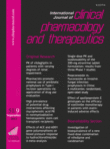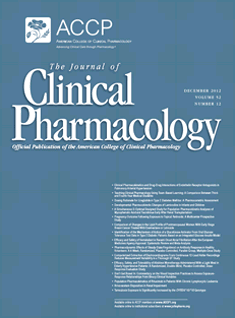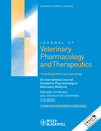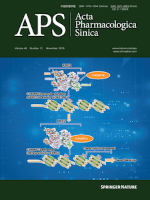
INTERNATIONAL JOURNAL OF CLINICAL PHARMACOLOGY AND THERAPEUTICS
Scope & Guideline
Unveiling the science behind effective therapeutics.
Introduction
Aims and Scopes
- Clinical Pharmacokinetics and Pharmacodynamics:
The journal publishes research on the absorption, distribution, metabolism, and excretion (ADME) of drugs, as well as their pharmacological effects, highlighting studies that explore how various factors influence drug behavior in the body. - Therapeutic Drug Monitoring and Optimization:
There is a strong emphasis on studies that assess therapeutic drug monitoring (TDM) practices to optimize medication efficacy and minimize toxicity, particularly in vulnerable populations such as those with renal impairment or undergoing chemotherapy. - Pharmacovigilance and Drug Safety:
The journal includes articles on post-marketing surveillance, adverse drug reactions, and safety profiles of medications, underscoring the importance of pharmacovigilance in clinical practice. - Bioequivalence and Drug Formulation Studies:
Research on the bioequivalence of drug formulations and their implications for therapeutic efficacy is a core area, reflecting the journal's commitment to ensuring that generic and branded medications provide similar therapeutic outcomes. - Impact of Comorbidities on Pharmacotherapy:
The journal frequently publishes studies examining how comorbid conditions affect drug therapy, especially in populations with complex health needs, such as the elderly or those with chronic diseases. - Network Pharmacology and Traditional Medicine:
Emerging themes include the use of network pharmacology to understand drug interactions and the efficacy of traditional medicine, particularly in the context of integrative approaches to therapy.
Trending and Emerging
- COVID-19 Treatment and Drug Interactions:
A significant increase in research related to COVID-19, including drug interactions and treatment efficacy, underscores the pandemic's impact on clinical pharmacology and the urgency for effective therapeutic strategies. - Real-World Evidence and Patient-Centered Research:
There is a growing emphasis on real-world evidence studies that assess drug efficacy and safety in diverse patient populations, moving beyond controlled clinical trial settings to understand practical therapeutic outcomes. - Network Pharmacology and AI in Drug Research:
The utilization of network pharmacology and artificial intelligence to analyze drug interactions and therapeutic targets is gaining traction, indicating a modern approach to drug discovery and personalized medicine. - Polypharmacy and Drug-Drug Interactions:
Research focused on polypharmacy, particularly in geriatric populations, is on the rise, reflecting concerns about adverse drug interactions and the need for careful medication management. - Therapeutic Strategies for Chronic Diseases:
Emerging studies are increasingly addressing therapeutic strategies for managing chronic diseases, such as diabetes and cardiovascular conditions, highlighting the need for tailored pharmacotherapy in these populations.
Declining or Waning
- Basic Pharmacology Studies:
There appears to be a waning interest in basic pharmacological studies that do not directly translate into clinical applications, as the journal increasingly prioritizes research with immediate clinical relevance. - Non-Clinical Trial Research:
The publication of studies that focus solely on non-clinical trial methodologies or theoretical frameworks has decreased, indicating a preference for clinical trial data and real-world evidence. - Historical Drug Use Studies:
Research focusing on historical trends in drug use or retrospective analyses that do not incorporate current clinical guidelines or practices is less frequently featured, suggesting a pivot towards more contemporary, applicable research. - Single-Agent Pharmacotherapy:
There is a noticeable decline in studies examining the effects of single-agent therapies, as the journal increasingly highlights multi-drug regimens and combination therapies that reflect real-world clinical practice. - Pharmacogenomics:
Although pharmacogenomics remains important, there has been a relative decrease in the number of studies dedicated solely to genetic factors influencing drug response, as more integrated approaches are favored.
Similar Journals

Frontiers in Pharmacology
Unlocking the potential of pharmacology through open access.Frontiers in Pharmacology, published by FRONTIERS MEDIA SA, stands as a leading open-access journal dedicated to advancing the field of pharmacology since its inception in 2010. With its ISSN 1663-9812, the journal is based in Switzerland and maintains a vital role in disseminating innovative research findings that span various disciplines within pharmacology, including pharmacokinetics, toxicology, and pharmacogenetics. In 2023, Frontiers in Pharmacology has achieved an impressive standing within the scientific community, being ranked in the Q1 category for both general and medical pharmacology, highlighting its critical contribution to the field with a Scopus ranking of #41 out of 272 in medical pharmacology and #76 out of 313 in pharmacology, toxicology, and pharmaceutics, placing it in the 75th and 85th percentiles, respectively. Researchers and practitioners benefit from its open-access model, which ensures widespread accessibility to groundbreaking research, fostering collaboration and innovation across the pharmaceutical sciences. With its commitment to excellence, Frontiers in Pharmacology serves as an essential resource for those looking to explore and contribute to the latest advancements in pharmacological research.

BMC Pharmacology & Toxicology
Advancing knowledge in pharmacology and toxicology.Welcome to BMC Pharmacology & Toxicology, a premier open-access journal dedicated to advancing the fields of pharmacology and toxicology. Published by BMC since 2012, this esteemed journal offers a platform for researchers, professionals, and students to disseminate cutting-edge research and innovative findings that explore the intricate interactions between drugs and biological systems. With its robust Q2 ranking in both general medicine and pharmacology categories for 2023, BMC Pharmacology & Toxicology is recognized for its significant contributions to the academic community, reflected in its strategic positioning within the 61st and 49th percentiles in Scopus rankings for related disciplines. The journal's commitment to open access ensures that vital research is accessible to a global audience, fostering collaboration and informed discussions. We invite you to engage with the latest studies, reviews, and innovative methodologies that shape the future of pharmacological and toxicological sciences.

JOURNAL OF CLINICAL PHARMACOLOGY
Transforming Clinical Practice with Cutting-Edge ResearchWelcome to the Journal of Clinical Pharmacology, an esteemed publication in the field of pharmacology and medical pharmacology, published by Wiley. Since its inception in 1973, this journal has been at the forefront of disseminating innovative research findings and comprehensive reviews that enhance our understanding of drug therapies and their clinical applications. With an impact factor that reflects its strong reputation and a Scopus ranking placing it in the 64th percentile among 272 journals in medical pharmacology, the journal stands as a critical resource for researchers, healthcare professionals, and students alike. Although currently not an Open Access journal, it provides invaluable insights into therapeutic drug use and safety, the pharmacokinetics of drugs, and the development of new therapeutic strategies. The journal's commitment to advancing the field through high-quality, peer-reviewed articles ensures it remains a vital asset in the continuously evolving landscape of clinical pharmacology.

JOURNAL OF VETERINARY PHARMACOLOGY AND THERAPEUTICS
Fostering Knowledge in Veterinary Pharmacology and TherapeuticsJOURNAL OF VETERINARY PHARMACOLOGY AND THERAPEUTICS is a crucial publication in the field of veterinary medicine, dedicated to advancing knowledge and practices related to pharmacology and therapeutic interventions in animals. Published by WILEY, this peer-reviewed journal has been a reliable source of innovative research since its inception in 1978, and it continues to play an integral role in shaping veterinary pharmacology through its commitment to high-quality scientific discourse. With an impact factor reflective of its robust academic standing, the journal is categorized in the Q3 quartile for Pharmacology and Q2 for Veterinary (miscellaneous) as of 2023, highlighting its relevance and significance within these domains. It is indexed in Scopus with commendable rankings, particularly in General Veterinary, where it ranks #45 out of 194, placing it in the 77th percentile. This journal not only offers a platform for original research articles but also caters to the dissemination of practical applications and reviews that are essential for veterinarians, researchers, and students alike in enhancing animal health and welfare. Although not an open-access publication, its contributions remain accessible to those engaged in the veterinary sciences through institutional subscriptions. The journal's enduring legacy and forward-looking approach make it a vital resource for anyone interested in veterinary therapeutics and pharmacology.

Clinical Pharmacology in Drug Development
Transforming clinical practices with groundbreaking research.Clinical Pharmacology in Drug Development, published by WILEY, is a distinguished journal dedicated to advancing the field of pharmaceutical science and drug development. With a strong commitment to disseminating cutting-edge research, this journal serves as a crucial platform for professionals, researchers, and students aiming to enhance their understanding of pharmacological principles and innovations in medical therapeutics. Since its inception in 2012, the journal has consistently maintained a noteworthy presence in the academic community, currently achieving a Q2 ranking in both Pharmaceutical Science and Medical Pharmacology categories as of 2023. Although the journal operates under a subscription model, it is highly regarded for its rigorous peer-reviewed publications, offering insights into drug efficacy, safety, and regulatory challenges. Positioned at the intersection of clinical practices and pharmaceutical advancements, Clinical Pharmacology in Drug Development plays an essential role in bridging the gap between scientific research and real-world application, ensuring that the latest therapeutic strategies are optimized for patient care.

ACTA PHARMACOLOGICA SINICA
Pioneering Insights in Medical PharmacologyACTA PHARMACOLOGICA SINICA is a premier journal in the field of pharmacology, published by the esteemed Nature Publishing Group. With a strong history since its inception in 1980, this journal is recognized for its impactful contributions to the fields of medicine and pharmacology, consistently securing a Q1 ranking in multiple relevant categories, including Pharmacology (Medical). Drawing on a robust international readership, it ranks impressively at #8 out of 272 in the specialty of Medical Pharmacology, placing it in the top 97th percentile according to Scopus data. Although currently not an open-access publication, ACTA PHARMACOLOGICA SINICA remains a vital resource for researchers, professionals, and students seeking to advance their understanding of pharmacological sciences. Its commitment to disseminating high-quality research underscores its significance in fostering innovation and exploration in the medical landscape.

DRUGS IN R&D
Empowering innovation in drug development and research.DRUGS IN R&D is a premier open access journal dedicated to advancing the field of pharmacology and drug development. Published by Springer International Publishing AG, this journal has been a valuable resource for researchers and professionals since its inception in 1999, contributing critical insights into the pharmacological sciences. With an impressive Impact Factor reflecting its significance, DRUGS IN R&D ranks in the Q2 quartile for Pharmacology, according to 2023 metrics, and ranks #151 out of 313 in the field of pharmacology and toxicology on Scopus. This journal offers an open access format, ensuring high visibility and accessibility of research findings to a global audience, supporting the intrepid pursuit of knowledge in drug research and development. By facilitating comprehensive discussions and innovative research findings, DRUGS IN R&D plays a crucial role in shaping the future landscape of pharmacological studies and advancements.

European Journal of Pharmacology
Elevating pharmacological knowledge for global healthcare progress.The European Journal of Pharmacology, a prestigious publication by Elsevier, serves as a vital resource in the field of pharmacology, offering rich insights into drug development and therapeutic applications. Since its inception in 1967, this journal has evolved to encompass groundbreaking research, including pharmacokinetics, toxicology, and innovative pharmacological methodologies, making it an essential platform for researchers and professionals alike. With an impressive impact factor that places it in the Q1 category of pharmacological journals and a Scopus ranking of #49 out of 313, the journal is recognized in the 84th percentile within its category, solidifying its significance in the academic community. Although the journal is not open access, it continues to attract contributions from leading scientists worldwide, ensuring that cutting-edge findings are disseminated effectively. The European Journal of Pharmacology not only highlights advancements in drug discovery and clinical applications but also promotes interdisciplinary collaboration, ultimately contributing to the progress of healthcare globally.

PHARMACIA
Exploring the frontiers of drug development and therapeutic science.PHARMACIA is a distinguished open-access journal, published by PENSOFT PUBLISHERS, that has been a pivotal platform for advancing the field of pharmaceutical sciences since 2007. This journal, with ISSN 0428-0296 and E-ISSN 2603-557X, is based in Bulgaria and continues to publish high-quality research and reviews relevant to pharmacy, pharmacology, and toxicology. Recognized in the Q3 category for Pharmaceutical Sciences and Pharmacology (medical), as well as Q2 in Pharmacy according to the latest rankings, PHARMACIA is celebrated for its commitment to fostering knowledge dissemination and innovation in drug development, therapeutic approaches, and pharmacological research. With a Scopus rank of #17 in Pharmacy and recognition in various health professions, the journal attracts contributions from researchers, professionals, and students seeking to impact the pharmaceutical landscape. Its convenient open-access format ensures that articles are readily available to a global audience, encouraging collaboration and advancement in the life sciences.

Clinical Pharmacology-Advances and Applications
Empowering Research for Better Patient OutcomesClinical Pharmacology-Advances and Applications is a premier open access journal published by DOVE MEDICAL PRESS LTD, based in New Zealand. Since its establishment in 2009, the journal has been dedicated to advancing the field of pharmacology by disseminating innovative research and applications related to medication therapy and patient outcomes. With its notable impact factor and current ranking within the top percentile of pharmacology journals, it provides an invaluable platform for researchers, healthcare professionals, and students to share knowledge and foster collaboration. The journal's content spans a wide range of topics, ensuring coverage of both fundamental and emerging areas in medical pharmacology. As of 2023, it holds a strong position in the Q2 quartile, underscoring its relevance and influence within the scientific community. Authors and readers alike benefit from its open access model, which ensures that critical findings are widely accessible, thereby enhancing the pace of discovery and application in clinical settings.